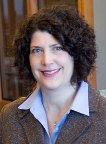- About Archives
- About SAA
- Careers
- Education
- Publications
- Advocacy
- Membership
 Professional Experience: Duke University, Director, Rare Book, Manuscript, and Special Collections Library, 2010–present. Emory University: Interim Director, Manuscript, Archives, and Rare Book Library, Assistant Director, 2004–2008. Coordinator for Research Services, 2002–2009. Curator for Southern History, 2001–2003. Director, Digital Archive, 2000–2003. Modern Political Collections Archivist, 1991–2000.
Professional Experience: Duke University, Director, Rare Book, Manuscript, and Special Collections Library, 2010–present. Emory University: Interim Director, Manuscript, Archives, and Rare Book Library, Assistant Director, 2004–2008. Coordinator for Research Services, 2002–2009. Curator for Southern History, 2001–2003. Director, Digital Archive, 2000–2003. Modern Political Collections Archivist, 1991–2000.
Education: PhD, History, Emory University, 2001. MLS, University of Pittsburgh, 1991. AB, Duke University, 1988.
Professional Activities: Society of American Archivists: Member since 1991. Technology Best Practices Task Force, 2006–2009, Chair, 2007–2009. Instructor, “Digital Libraries and Digital Archives,” 2006. Instructor, “Digitization of Archival Materials,” 2006. Encoded Archival Description Roundtable, Chair, 2000. Congressional Papers Roundtable Steering Committee, 1997–1999, Chair, 2004. Society of Georgia Archivists: Nominating Committee, 2003. Associate Editor, Provenance, 2002–2004. Incorporation Subcommittee, Chair, 2001, Secretary, 1999–2000. Other Activities: Co-Instructor, “Born Digital Materials: Theory and Practice,” Rare Book School, 2010, 2011. Peer reviewer, NHPRC Digitizing Historical Records Projects, 2009. Grant Review Panel, NEH, 2006. Aquifer Initiative, Digital Library Federation, 2005–2007. EAD Advisory Group, RLG, 2002–2003. Records Management Task Force for the Advisory Committee on the Records of Congress, 2000–2002. RBMS member.
Awards: Co-recipient of SAA C. F. Coker Award, 2004.
Publications and Presentations: “Beyond the Bitstream: Are Born-Digital Special Collections Really Special?” ACRL Invited Paper, 2011. “‘Archiving’ Digital Lives: Choices, Challenges, and Change,” Digital Library Federation Fall Forum, 2010. Co-author, "Approaches to Managing and Collecting Born-Digital Literary Materials for Scholarly Use," White Paper to the NEH Office of Digital Humanities Level 1 Digital Humanities Start-Up Grant, 2009. “Collecting Digital Lives: A Tale of Two Donors,” Digital Lives Conference, The British Library, 2009. “Taking a Byte Out of Congress: Reconsidering the Research Use of Correspondence and Casework Files,” An American Political Archives Reader, 2009. “The Changing Shape of Archives,” FLAIR Symposium, Harry Ransom Center, 2008. “How Can We Tell You What We’ve Got? Describing Archival Collections in the Digital Age,” American Historical Association, 2004. “Constituent Mail Analysis Project,” International Association for Social Science Information Service and Technology," 2003. “Database Co-Dependence: It’s All Relative,” SAA, 1997.
Question posed by the Nominating Committee: SAA has developed three strategic initiatives: technology, diversity, and public awareness/advocacy. If elected to Council, how will you work with SAA groups and members to move these forward?
It is impressive to read the recent Strategic Priority Outcomes and Activities report and see the number and range of SAA activities, events, and publications related to the Society’s strategic priorities. As a member of Council, I would seek to build on this good work in three areas. First, to better reach busy professionals we should help members to more quickly find key information related to the priorities. For example, while is essential for the Society to have a detailed strategic plan, there is a concurrent need for summaries that concisely sum up the plans and progress for each priority area. A point of contact should be provided for each in-process measurable activity so that members will be able to easily connect with the groups working on that activity. It would also be helpful to be able to filter the news on the SAA home page for updates related to a particular strategic priority.
Second, we should continue to extend our use of technology to facilitate collaboration. The easier it is for us to work together, the more we will accomplish. For example, the ability to comment on a particular paragraph within a posted document might encourage feedback at a more granular level and might then lead to comments from others on that point. It is important to continue to use multiple channels of communication: formal and informal, in person and in print, with individuals and with groups, real time and asynchronous.
Finally, we need to remember to have fun and to celebrate what we accomplish together. We could develop short polls or quizzes for the website or Facebook page that spread awareness or ask for quick feedback. Member-authored pieces in Archival Outlook could provide a personal perspective on the impact of the strategic priorities (or call for new directions.) We should think creatively (and economically) about how we might recognize and thank those who contribute to moving the activities forward.
The strategic priorities will be what we as members make of them. If elected to Council, I will work to make it as easy as possible for you find out what’s going on and get involved. Thank you for your consideration.